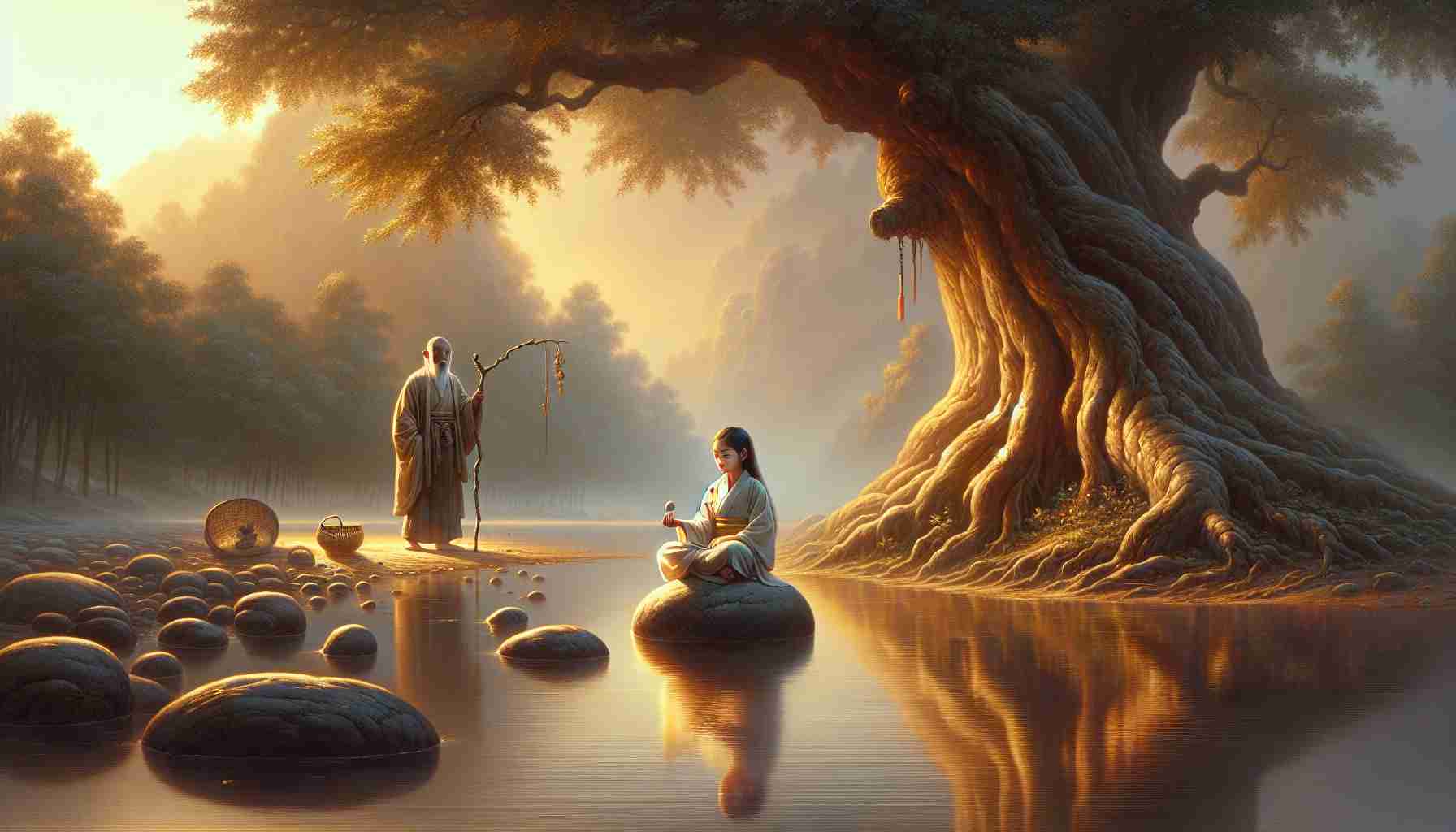

The wind was soft that morning, whispering through the trees like it carried old secrets. I was sitting by the river behind our village, skipping stones and trying to forget I had chores waiting at home. My name is Mei, and I was eleven summers old the day I learned the power of balance.
Lately, everything had been loud—school, my parents, even the inside of my own head. I felt like I was always getting pushed, like a leaf in a storm I couldn’t control. I wanted quiet. I wanted peace.
That’s when I saw him—Old Master Shen. He was the village gardener, slow-moving and quiet, but always smiling like he knew something the rest of us didn’t. He walked through the gardens every morning with a basket and a stick, talking to plants like they were old friends.
That day, he saw me sitting by the river and waved me over. “Stone skipping again?” he asked. “Careful not to skip past what matters.”
I laughed but followed him. He didn’t say much as we walked the path between orange trees and bamboo. Birds chirped, and the breeze danced around us like a welcome song.
He finally stopped by a crooked tree, its branches leaning one way, its roots deep on the other side. “Why doesn’t it fall?” he asked, pointing.
“I don’t know,” I said. “Shouldn’t it tip over?”
“It doesn’t,” he said, “because it knows how to balance.”
I didn’t understand.
Master Shen sat down on a flat stone. “Let me tell you something from the Tao,” he said softly. “Tao means ‘The Way.’ It is not about pushing harder, fighting more, or rushing ahead. Sometimes, peace comes when we do… less. That is called Wu Wei—non-action.”
“But how do I fix things if I don’t try hard?” I asked. “School is hard. My parents are strict. My mind is full.”
He smiled. “If you stir the pond with a stick, can you see your reflection?”
“No,” I said.
“But if you sit still, the water clears.”
I blinked. His words didn’t explain everything, but they felt warm, like sunlight in winter. We sat there for a long time, just listening to the wind.
That night, I didn’t argue when my parents gave me chores. I washed the bowls gently, not rushing, not complaining. And something strange happened—I felt a quiet joy.
The next morning, I sat still by the river, not skipping stones this time. A duck floated past. The trees swayed. My breath felt slower, and my thoughts weren’t fighting anymore.
I didn’t change overnight. But now, whenever I feel the storm inside, I remember the tree. It leans, it listens, and it never tries to stand straight. It just grows the way it was meant to.
I still go to school. I still have chores. But now I’m learning there’s a space between effort and ease. In that space, I find balance. And in balance, I find peace.
The wind was soft that morning, whispering through the trees like it carried old secrets. I was sitting by the river behind our village, skipping stones and trying to forget I had chores waiting at home. My name is Mei, and I was eleven summers old the day I learned the power of balance.
Lately, everything had been loud—school, my parents, even the inside of my own head. I felt like I was always getting pushed, like a leaf in a storm I couldn’t control. I wanted quiet. I wanted peace.
That’s when I saw him—Old Master Shen. He was the village gardener, slow-moving and quiet, but always smiling like he knew something the rest of us didn’t. He walked through the gardens every morning with a basket and a stick, talking to plants like they were old friends.
That day, he saw me sitting by the river and waved me over. “Stone skipping again?” he asked. “Careful not to skip past what matters.”
I laughed but followed him. He didn’t say much as we walked the path between orange trees and bamboo. Birds chirped, and the breeze danced around us like a welcome song.
He finally stopped by a crooked tree, its branches leaning one way, its roots deep on the other side. “Why doesn’t it fall?” he asked, pointing.
“I don’t know,” I said. “Shouldn’t it tip over?”
“It doesn’t,” he said, “because it knows how to balance.”
I didn’t understand.
Master Shen sat down on a flat stone. “Let me tell you something from the Tao,” he said softly. “Tao means ‘The Way.’ It is not about pushing harder, fighting more, or rushing ahead. Sometimes, peace comes when we do… less. That is called Wu Wei—non-action.”
“But how do I fix things if I don’t try hard?” I asked. “School is hard. My parents are strict. My mind is full.”
He smiled. “If you stir the pond with a stick, can you see your reflection?”
“No,” I said.
“But if you sit still, the water clears.”
I blinked. His words didn’t explain everything, but they felt warm, like sunlight in winter. We sat there for a long time, just listening to the wind.
That night, I didn’t argue when my parents gave me chores. I washed the bowls gently, not rushing, not complaining. And something strange happened—I felt a quiet joy.
The next morning, I sat still by the river, not skipping stones this time. A duck floated past. The trees swayed. My breath felt slower, and my thoughts weren’t fighting anymore.
I didn’t change overnight. But now, whenever I feel the storm inside, I remember the tree. It leans, it listens, and it never tries to stand straight. It just grows the way it was meant to.
I still go to school. I still have chores. But now I’m learning there’s a space between effort and ease. In that space, I find balance. And in balance, I find peace.